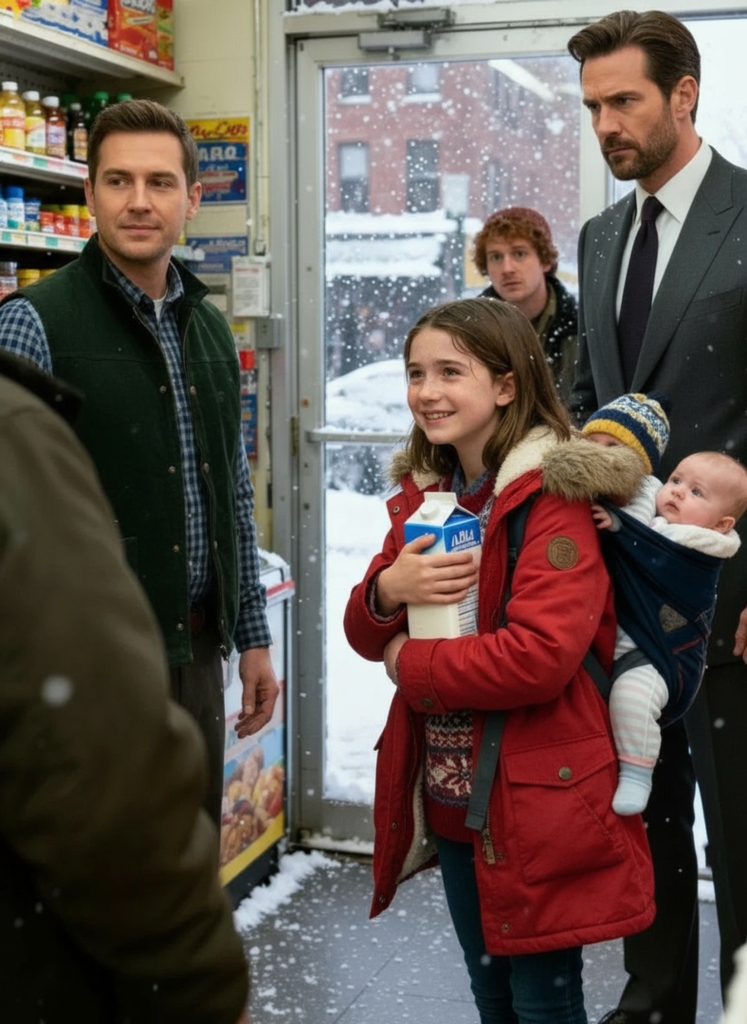“Get out! And don’t you ever come back!”
The manager’s harsh voice cut through the small grocery store in downtown Chicago.
A ten-year-old girl stumbled outside, clutching her thin jacket against the biting October wind. Her cheeks were red, her eyes swollen from crying.

The reason for her humiliation?
A single box of milk.
Her name was Emily Carter. She wasn’t a thief by nature—just a child forced into desperation.
At home, her two little siblings, six-year-old Liam and four-year-old Sophie, were waiting. They hadn’t eaten since the night before.
Their mother had died two years earlier, and their father, weighed down by grief and exhaustion, was barely managing odd jobs to keep the lights on. That day, Emily had made a heartbreaking choice: to steal one thing that could help them survive.
But the world wasn’t kind to desperate children.
The store manager, Mr. Reynolds, caught her before she reached the door. Without asking why, he grabbed her by the arm, scolded her in front of customers, and threw her out.
Emily stood on the sidewalk, shivering, ashamed, and alone.
Then—someone stopped.
A tall man in a dark suit watched from across the street. Michael Harrington, a self-made millionaire and CEO of a logistics company, had been on his way to a meeting when he saw it happen.
He’d grown up poor himself, the son of a single mother who worked three jobs just to feed him and his brother. Watching the scene unfold brought back memories he thought he’d buried long ago.
Michael crossed the street.
“Hey, are you okay?” he asked gently.
Emily flinched, her small hands tightening around her jacket. The crushed box of milk lay at her feet. She didn’t answer—too frightened to speak.
The store manager came out again, shaking his head.
“She’s a thief,” he said gruffly. “Tried to steal from me. Kids like that need to learn a lesson.”
Michael’s voice stayed calm, but his eyes hardened.
“A lesson?” he asked quietly. “She’s a child. Do you even know why she did it?”
Mr. Reynolds shrugged. “Doesn’t matter. Stealing is stealing.”
Michael knelt beside Emily, lowering his voice.
“Why did you take the milk?” he asked softly.
Her lips trembled. “For Liam and Sophie,” she whispered. “They’re hungry.”
For a moment, the city noise faded.
Michael stood up, reached into his wallet, and handed the manager a crisp hundred-dollar bill.
“For the milk,” he said coldly. “And for the way you treated her.”
Then he picked up the crushed box and turned back to Emily.
“Come with me,” he said, his tone firm but kind. “Let’s get you and your family something to eat.”
A few blocks later, they sat in a small café.
Emily’s fingers wrapped around a steaming cup of hot chocolate while Michael ordered sandwiches and, of course, a fresh carton of milk.
Bit by bit, Emily told him her story—how their mother had died from cancer, how their father worked whenever he could, and how she had become the caretaker of her younger siblings.
Michael listened silently, every word tugging at memories of his own childhood—of worn-out shoes, skipped dinners, and his mother’s quiet sacrifices.
When she finished, he asked gently, “Where do you live, Emily?”
“In an apartment,” she murmured. “It’s… not nice. But it’s all we have.”
Michael’s heart tightened.
“I’d like to see it,” he said. “Not to judge—just to help.”
Emily hesitated, then nodded.
They walked through cracked sidewalks and flickering streetlights until they reached a run-down building. Inside, two small children huddled under thin blankets. When Emily entered with food, their faces lit up.
“This is Michael,” she said shyly. “He’s helping us.”
Michael smiled and crouched beside them.
“Hi there. I brought you something warm to eat.”
As the children devoured the food, Michael made a silent promise to himself—he wouldn’t just walk away.
Over the next few days, Michael took action.
He contacted social services—not to take the children away, but to support them.
He hired a nanny to help with meals, arranged counseling for their father, and enrolled the children in better schools.
He even set up a small trust fund to ensure they’d never go hungry again.
But more than money, Michael gave them something they hadn’t felt in a long time—hope.
He visited often, bringing groceries, books, and warmth to their small apartment.
Weeks later, Emily walked beside him after school, her backpack swinging at her side.
“Why did you help us?” she asked quietly. “You didn’t even know us.”
Michael smiled.
“Because once, when I was a boy, someone helped me. And it changed my life. Now it’s my turn.”
Emily’s eyes sparkled. “Then when I grow up, I’ll help kids too—just like you.”
Michael placed a gentle hand on her shoulder.
“That’s the best thank you I could ever get.”
The night air was cold, but for the first time in years, Emily felt warm inside.
From being thrown out of a store in shame, she and her family had found kindness—and a new beginning.
And sometimes, that’s all it takes to change a life forever.